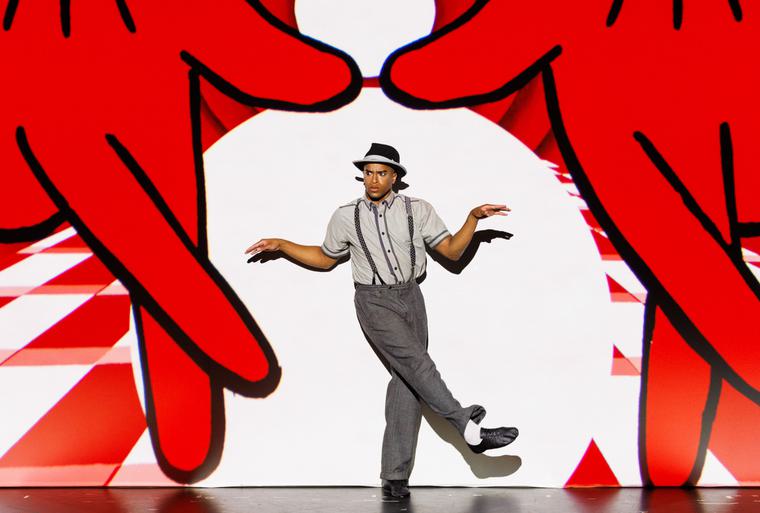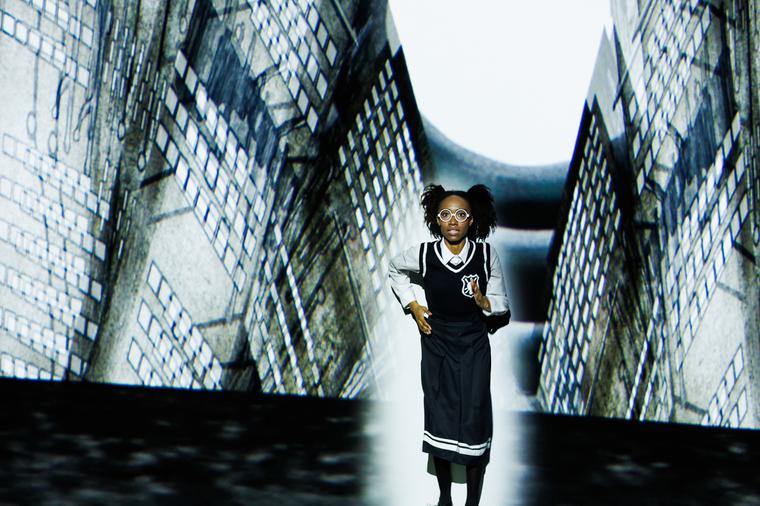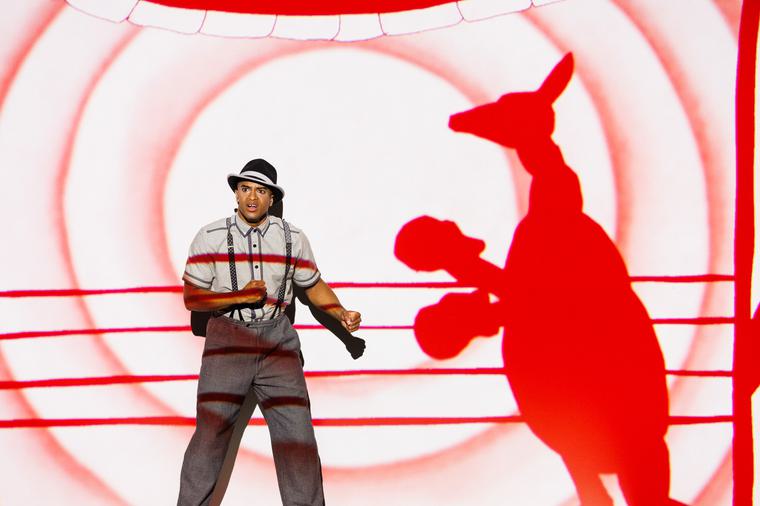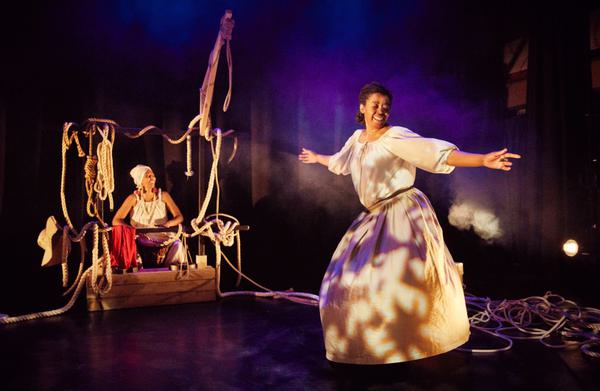News Story
Next week, we are delighted to welcome back internationally celebrated performance company 1927 for their newest production Please right back.
Known for their innovative approach to theatre, merging animation with live performance, 1927 gripped Oxford audiences with the groundbreaking production of Golem in 2017. They now return with Please right back, direct from a sell-out run at the Edinburgh International Festival.
The show follows the story of a family whose father has disappeared. Kim and Davey, the children of Mr E, can only communicate with him through letters, in which his imagination takes over and reality collides with fantasy.
Using a unique combination of handcrafted animation, music and live performance, Please right back is inspired by true events, exploring the difficulties children can go through when a parent leaves the family. With each letter opening up a fantastical world for Mr E’s children, 1927’s production celebrates the wider power of the imagination and how it can be used to make things better in hard times.
Kicking off their national tour in Oxford from Wednesday 25 to Saturday 28 September, we spoke to Co-Artistic Directors of 1927, Suzanne Andrade and Paul Barritt, to find out more about their bold new production.

1927 | Please right back
Credit: Andrew PerryCan you give us a brief overview of your creative journey as a company leading up to the point of making this show?
Suzanne: We started off working in art galleries, backrooms of pubs, performance, poetry, gigs, Glastonbury festival, and creating little vignettes, little short pieces. We didn't necessarily think we were going to end up working in theatre, actually, but we were very much working in a live context with animation, live action, music performance. That was nearly 20 years ago now. Then we put together some scratch performances at Battersea Arts Centre, again, not being quite sure if we're going to make shows. And then Paul and I took a show to the Edinburgh Festival in 2006, which was a huge flop, but I think it was quite key for us because it was this weird show, but we loved it! It really gave us this binding spirit of, ‘Right, we're going to come back next year, and we're going to really try and do this’. Then we took a show to Edinburgh the following year, and they all sold out, and we had people from all over the world coming in and subsequently booking the show. The next thing we know we're in Sri Lanka and New York and Washington and New Zealand and South Korea. It was really, really surreal, going from South Carolina to South Korea, touring for years.
Paul: It takes us so long to make shows, so we're not pumping them out every six months, it’s more like every few years. Each show has its own trajectory. The Animals and Children Took To The Streets, which was our second show, was the first time we used a narrative for a whole show. And then The Magic Flute was an expansion of what we do, and a key show, and it really opened up the world for us, working in opera houses. Then we made Golem which had a run in the West End.
Suzanne: It feels like it’s almost a trilogy with The Animals and Children Took To The Streets and Golem. Please right back feels like the third of this kind of show. It’s a partner piece to those other shows.

1927 | Please right back
Credit: Andrew PerryWhat would you say is unique about your work and how you work together?
Paul: It’s such a specific way of working that we've come up with. You can't just start, get a script and direct it in eight weeks and leave - it takes ages to make it.
Suzanne: It’s very collaborative. And that's the only way it can work. To interweave the animated world and the acting and the stories and the music, it has to be collaborative from the second we begin devising. If this character is going to be animated, how are these scenes going to work? So it’s all about communication and collaboration. And I think that's part of what's unique. In rehearsals there's projection screens up and the projector so all the rehearsals are always happening with the animations. It's just so integral to the rehearsal room. It’s all developing together all the time. That’s why it's a long process. I think it's what's unique about it. We’re really looking forward to opening the show, but it's almost endless, the world of animation and acting and them coming together, and how you get the two things to really marry is unique about it, but what's also immensely time consuming.
Paul: We have a pretty idiosyncratic way of directing and writing and animating. We've got a good frame of reference, I think, and with the type of work we do, we're able to actually draw those frames of reference into it, which I think, is quite an enviable thing really. If you've got an influence from something, say you want to do something a bit constructivist, you can put it in there. We’ve played with loads of different styles, but it always remains within a kind of stylistic world. There are lots of different elements.
Tell us a bit about the story of Please right back?
Suzanne: The criminal justice system has always been up there as something to write about. And the education system is something we constantly return to. Children and the imagination are themes that are always playing around in our minds. This show is directly dealing with that. It’s very loosely based on some letters written by my dad when he was in prison when I was growing up. I found a few of these letters and said to Paul that I wondered if this is a springboard, a relationship between a parent who's in prison and his children. The letters were quite imaginative that my dad wrote, as if he was having a great time in prison. He was trying to make this very adult, very unpalatable experience more palatable and playful for his children. We were eleven, and nine at the time. We thought, maybe they’re our protagonists - a dad, who's in prison, and a daughter, a little girl, and her brother. We started there.
Paul: Ultimately, I think the show is more about education than about the justice system as such, more about the children of intergenerational crime - that's really the core political thing that it's about. But it's also about the power of the imagination, and how exactly like Suzanne says, the imagination can be used to help make things easier and better, and why not tell crazy stories? It’s about a father being away from his kids at the end of the day. They don’t want to be apart, and have been pushed apart and it's about that really.

1927 | Please right back
Credit: Andrew PerryWhat’s the story of the show with the letters?
Paul: You open in one of the letters and then you come back to the kids reading the letter, back into a domestic world, so you go from a black and white kitchen sink type scenario to these much more colourful worlds of the letters. Kim, the main character, wants to believe the letters and wholeheartedly believes that her dad is on these adventures. But gradually that starts to unpick, and she eventually finds out the truth and doesn't take it very well and rebels. She has this kind of ‘dark night of the soul’ moment where she pushes her dad away, but then ultimately comes back to him. So, it’s ultimately a coming of age story for her. Running alongside this other narrative about this projected new form of education.
Suzanne: It’s this academy system, where the children of offenders go to this school. 65% of boys with a dad in prison go on to offend themselves, so the idea is to nip that in the bud by just giving them a really strict discipline before these children even think about committing a crime.
Paul: The core of the story is the letters and the move between those worlds.
What else would you like to say to potential audiences?
Suzanne: You will really have fun coming to the show. You’ll see things you've never seen before. Certainly things you've never seen in this mix of animation and live action. Our cast is amazing. It’s genuinely one for the whole family.
Paul: Yes, there’s something for everybody. Your granny will like it, your dad will like it. It’s also moving.
Suzanne: There’s a lot of heart, a lot of humour, a lot of mayhem. It’s two hours of this strange dream - you'll come out and go, “did we just watch that?”. We’ve really started to try and throw up some questions about what sort of future we want our children to have, and the importance of encouraging imagination in children. We know maths and English are important, but the importance of storytelling and imagination and play for our children, I think that's something that everyone of any age can discuss and get on board with. And we do it all in a quite humorous way.









